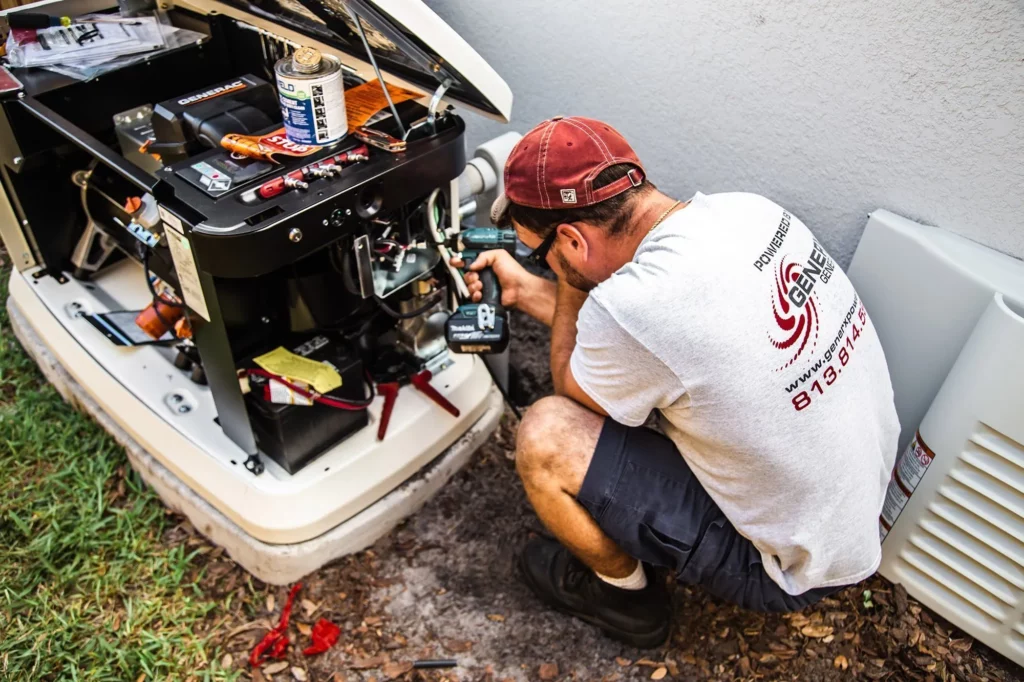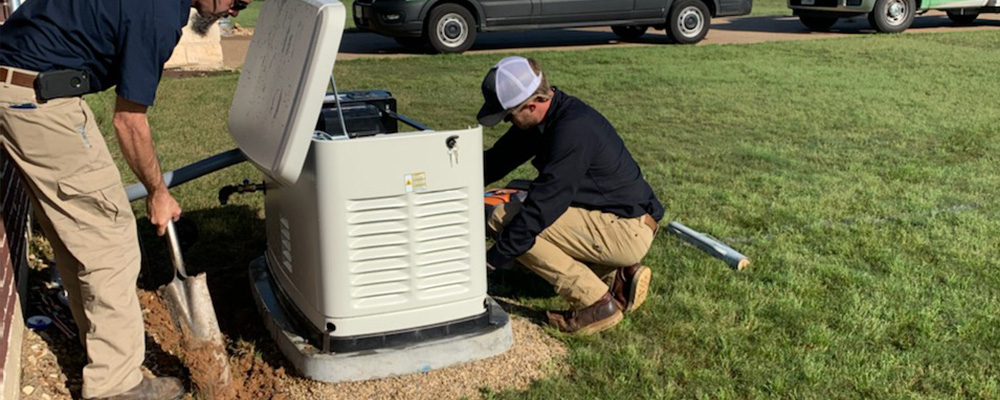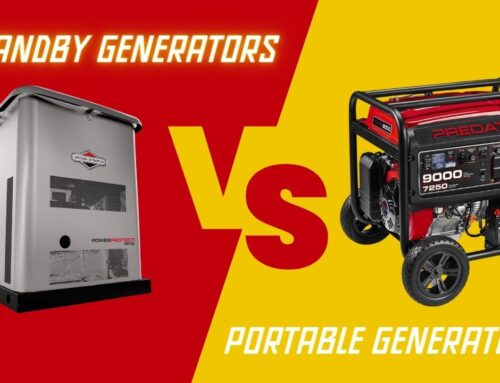In today’s world, where electricity is synonymous with convenience and productivity, a backup power source is not just a luxury but a necessity. Generators play a crucial role in providing an invaluable service by powering our homes and businesses during outages. However, like any other machine, generators are not immune to wear and tear.
This guide aims to equip you with the knowledge you need to maintain your generator effectively. From understanding common issues that generators face to knowing when to call a professional for repairs, this guide will walk you through everything you need to know to keep your generator in optimal condition.
In the following sections, we will delve deeper into the common issues with generators, preventative maintenance tips, the pros and cons of DIY vs. professional repairs, and how to find a reliable repair service. We will also discuss the costs of ignoring necessary generator repairs and provide key takeaways that every generator owner should know.
Why Generator Repairs are Important
Generators are complex machines with numerous components, each of which plays a vital role in their operation. When one part fails, it can lead to a domino effect, causing other parts to fail. Regular maintenance and timely repairs are not just about keeping the generator running; they are about ensuring it runs efficiently and safely. A poorly maintained generator is more likely to break down and can be a safety hazard.

The Cost of Neglect
Owning a generator is akin to having an insurance policy for your electricity needs. It’s there when you need it most, ensuring your life or business operations continue smoothly even when the power grid fails. However, like other machinery, generators require regular maintenance and timely repairs. Neglecting these essential tasks can have significant effects on your way of life:
- Expensive Repairs: Small issues left unattended can escalate into major problems. What might have been a simple, inexpensive fix can turn into a costly repair job. For instance, neglecting oil changes can lead to engine failure, which is far more expensive.
- Replacement Costs: In extreme cases, neglect can lead to the complete failure of a generator. When this happens, the only option may be to replace the entire unit, which is a significant expense.
- Downtime for Businesses: A malfunctioning generator can mean significant downtime for businesses that rely on constant power. This can lead to lost revenue, missed opportunities, and a tarnished reputation.
- Disruption in Critical Services: Power is needed to run life-saving equipment in healthcare facilities. A failed generator in such settings can have dire consequences.
- Fire Risk: A poorly maintained generator is a fire hazard. Leaking fuel, frayed wires, and overheated components can all lead to fires.
- Health Risks: A malfunctioning generator can produce harmful emissions, including carbon monoxide, a deadly, odorless gas.
Emotional and Convenience Costs
- Stress and Anxiety: Knowing that your generator is unreliable can be a source of constant stress, especially during severe weather conditions when you are most likely to need it.
- Loss of Comfort and Convenience: A non-working generator during a power outage means no lights, no heating or cooling, and no power for essential appliances. This can greatly affect your quality of life, especially during extended outages.
PGN | Generator Repair Solution at your Fingertips
Start your search with Power Generation Nation today! Find the #1 Local Generator Repair team…
Search PGN’s Directory
Common Issues with Generators
Generators are designed to be robust and reliable, but like all machines, they are not immune to problems. Regular maintenance can prevent many issues, but even the most well-maintained generator can develop faults over time. Understanding these common issues is a fundamental chapter in the A-Z of Generator Repairs that every owner should know. Here are some of the most frequent problems that generators encounter:
- Engine Overheating: This can occur due to a lack of coolant, a faulty radiator, or an obstructed cooling system. Overheating can cause significant damage to the engine and other components.
- Oil Leaks: Oil leaks are a common issue and can lead to engine damage if not addressed promptly. Regular checks for oil leaks are a crucial part of generator maintenance.
- Fuel System Issues: Problems with the fuel system, such as clogged filters or degraded fuel, can prevent the generator from starting or cause it to run inefficiently.
- Faulty Alternator: The alternator converts mechanical energy into electrical energy. A faulty alternator will result in the generator not producing electricity.
- Wiring Issues: Damaged or improperly installed wiring can lead to problems, from inefficient operation to potential fire hazards.
- Battery Failure: The battery is essential for starting the generator. If it fails, the generator won’t start. Regular checks and keeping the battery charged are essential.
Control Panel and Sensor Issues
- Malfunctioning Control Panel: The control panel is the brain of your generator. If it malfunctions, it may not start, may not produce electricity, or may not shut down after a power failure is resolved.
- Faulty Sensors: Modern generators have a range of sensors that monitor everything from oil pressure to engine temperature. If these sensors fail, they can send incorrect signals to the control panel, leading to improper operation.
Environmental and External Factors
- Poor Ventilation: Generators need adequate ventilation to dissipate heat. Poor ventilation can lead to overheating and reduced efficiency.
- Exposure to Elements: Generators not adequately protected from the elements (rain, snow, extreme temperatures) can suffer from corrosion and other damage.
- Neglected Air Filter: A clogged air filter will force the engine to work harder, leading to overheating and increased wear and tear.
- Stale Fuel: Fuel that sits in the tank for extended periods can become stale and may cause the generator to run poorly or not start.

Preventative Maintenance for Generators
Preventative maintenance is the cornerstone of generator care. It involves regular inspections and servicing to ensure that your generator is always ready to operate at its best when you need it. Proper preventative maintenance can extend the life of your generator, improve its efficiency, and reduce the risk of costly breakdowns. Every owner should know this is a key aspect of the A-Z of Generator Repairs. Here are some essential preventative maintenance tasks for generators:
- Visual Checks: Regularly inspect your generator for signs of wear, damage, or leaks. Look for frayed wires, loose connections, and signs of corrosion.
- Listening for Irregularities: During the operation, listen for unusual noises such as knocking, rattling, or high-pitched squeals, which can indicate problems.
- Changing the Oil: Regular oil changes are essential for the health of your generator’s engine. Follow the manufacturer’s recommendations regarding the frequency and type of oil to use.
- Replacing Filters: Regularly replace air, fuel, and oil filters to ensure your generator runs cleanly and efficiently.
- Cleaning the Generator: Keep the generator and surrounding area clean and debris-free. This helps to ensure proper ventilation and reduces the risk of fire.
- Regular Start-Up Tests: Regularly run your generator, even when you don’t need it, to ensure that it will start and operate correctly when you do need it.
- Load Testing: Periodically test your generator under load to ensure it can handle the power requirements you will place on it during an outage.
- Monitoring Fluid Levels: Regularly check and maintain the levels of all fluids, including oil, coolant, and fuel.
Scheduled Professional Service
- Annual Inspection: Have a professional technician inspect your generator at least once a year. They can identify and address issues that you might miss.
- Calibration and Tuning: A professional service should include calibrating all controls and settings, ensuring your generator operates efficiently and safely.
Scheduling Generator Repairs Made Easy
Power Generation Nation is Your All-in-One Directory for Everything Generators
Search PGN’s Directory
DIY vs. Professional Repairs
When a generator shows signs of wear or malfunctions, owners are faced with a critical decision: to attempt a DIY repair or call a professional. Both approaches have their merits and drawbacks, and understanding these is a vital part of the A-Z of Generator Repairs that every owner should know. Here’s a closer look at the pros and cons of DIY vs. professional repairs:
DIY Repairs
- Cost Savings: One of the most appealing aspects of DIY repairs is the potential for cost savings. By doing the work yourself, you avoid labor costs.
- Immediate Attention: You can address the issue as soon as you notice, without waiting for a professional to become available.
- Learning Experience: Repairing your generator can be a valuable learning experience, teaching you more about how your equipment works.
- Safety Risks: Without proper training, attempting to repair a generator can be dangerous. There is a risk of electrical shock, burns, and other injuries.
- Potential for Further Damage: A lack of expertise can lead to mistakes that may exacerbate the problem, leading to more extensive and costly repairs down the line.
- Voiding Warranty: DIY repairs can void the manufacturer’s warranty, leaving you without this protection if major issues arise later.
Professional Repairs
- Expertise and Experience: Professional technicians have the training and experience to accurately diagnose and repair complex issues.
- Safety: Professionals know how to perform repairs safely, reducing the risk of injury and further damage to the generator.
- Warranty Preservation: Using a professional service will likely align with the terms of your generator’s warranty, preserving this valuable protection.
- Cost: Due to labor and service fees, professional repairs can be more expensive upfront.
- Wait Time: Depending on the availability of a technician, you might have to wait for an appointment, which can be inconvenient during a power outage.
Professional Repairs
When deciding between DIY and professional repairs, consider the complexity of the issue, your level of technical skill, the potential risks involved, and the terms of your generator’s warranty. DIY might be viable for simple, low-risk tasks like changing oil or filters. Hiring a professional is often safer and more prudent for complex issues, especially those involving electrical components.

The A-Z of Generator Repairs: Key Takeaways
As we navigate the complexities of generator ownership, it is clear that understanding the ins and outs of generator repairs is not just a matter of convenience—it’s a matter of safety, efficiency, and long-term cost savings. Here are the key takeaways from the A-Z of Generator Repairs that every owner should internalize:
1. Regular Maintenance is Non-Negotiable
- Regular maintenance is the foundation of a healthy, long-lasting generator. It includes routine inspections, oil changes, filter replacements, and more. This proactive approach helps to identify and resolve issues before they escalate into major problems.
2. Understand the Common Issues
- Familiarize yourself with generators’ common issues, from mechanical and electrical failures to control panel malfunctions. Knowing what can go wrong is the first step in effectively preventing or addressing these issues.
3. Know When to Call a Professional
- Not all generator issues are suitable for DIY fixes. Recognize when a problem is beyond your skill level and when to call in a professional technician. This is often the safest and most cost-effective solution in the long run.
- Your generator is a significant investment. Protect it by following the manufacturer’s guidelines for maintenance, using high-quality fuel and oil, and storing it in a clean, dry, and well-ventilated area.
- Be aware of the terms of your generator’s warranty. Unauthorized repairs or failure to perform regular maintenance can void these warranties, leaving you without this layer of financial protection.
- Regularly test your generator under load conditions similar to what it would experience during a power outage. This ensures that it will be ready to perform when you need it most.
- The more you know about your generator, the better. Read the owner’s manual, take advantage of online resources, and consider attending a basic generator maintenance course.
8. The Cost of Neglect is High
- Ignoring the need for regular maintenance and timely repairs can lead to expensive and potentially dangerous situations. The cost of neglect is far higher than the cost of regular, proactive care.

Power Generation Nation by Your Side
The A-Z of Generator Repairs is more than a manual—it’s a comprehensive guide designed to empower every generator owner with the knowledge they need to make informed decisions. It’s about understanding the responsibilities of generator ownership and being proactive in fulfilling those responsibilities. In the end, a well-maintained generator is reliable, and that reliability can make all the difference when the power goes out.
You are not alone in this journey toward responsible and effective generator ownership. Power Generation Nation has you covered. As the nation’s first and only online directory for local generator repair and preventative maintenance service companies, Power Generation Nation is your go-to resource for finding qualified and reliable professionals in your area.
Whether you are in need of emergency repairs, scheduled maintenance, or simply seeking advice on how to care for your generator, Power Generation Nation connects you with experienced service providers who are committed to helping you get the most out of your investment.
With Power Generation Nation, you have direct access to a network of experts who understand the critical role generators play in our lives, especially during times of crisis. These professionals are dedicated to ensuring that your generator is always in optimal condition, ready to provide you with power when you need it most.





